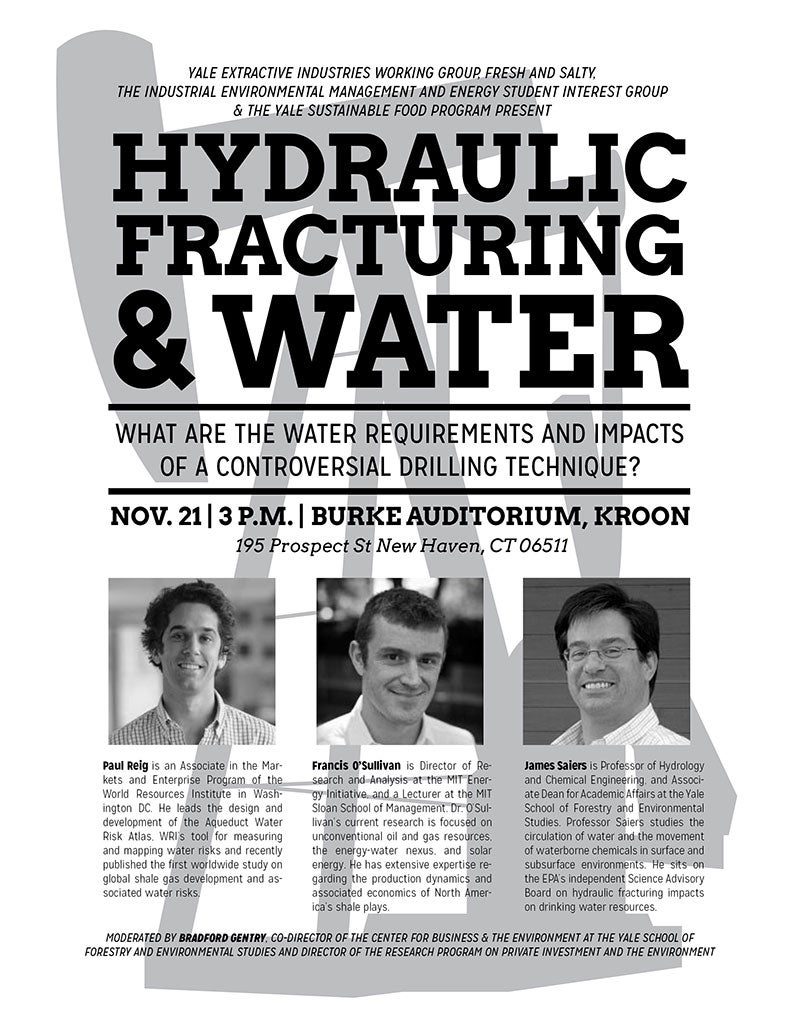Note: Yale School of the Environment (YSE) was formerly known as the Yale School of Forestry & Environmental Studies (F&ES). News articles and events posted prior to July 1, 2020 refer to the School's name at that time.

A group of national water experts will discuss the potential consequences of the controversial drilling method known as hydraulic fracturing, or fracking, during a panel discussion on Friday at the Yale School of Forestry & Environmental Studies (F&ES).
In addition to addressing the impacts on water quality, participants will discuss how much water is required by fracking systems in comparison with other extraction techniques; whether U.S. states have the water capacity to meet these needs long term; and whether the appropriate regulatory framework is in place to assure that the fracking of natural gas can be done sustainably.
The discussion will begin at 3 p.m. in Kroon Hall’s Burke Auditorium. It is open to the public.
“We’ve heard a lot about water contamination and water quality in general when it comes to hydraulic fracturing,” said Véronique Bourg-Meyer ’15 M.E.M., one of the organizers of the event. “Impacts on water quality are important, but we also wanted to bring people with expertise to discuss the water use requirements of hydraulic fracturing and the technical aspects of this type of extraction, specifically with water scarcity being a growing concern in so many communities throughout the United States.”
The panelists include:
The event is being hosted by the Extractive Industries Working Group at Yale; Fresh and Salty, a student interest group interested in water-related issues; the Industrial Environmental Management and Energy student interest group; and the Yale Sustainable Food Program.
In addition to addressing the impacts on water quality, participants will discuss how much water is required by fracking systems in comparison with other extraction techniques; whether U.S. states have the water capacity to meet these needs long term; and whether the appropriate regulatory framework is in place to assure that the fracking of natural gas can be done sustainably.
The discussion will begin at 3 p.m. in Kroon Hall’s Burke Auditorium. It is open to the public.
“We’ve heard a lot about water contamination and water quality in general when it comes to hydraulic fracturing,” said Véronique Bourg-Meyer ’15 M.E.M., one of the organizers of the event. “Impacts on water quality are important, but we also wanted to bring people with expertise to discuss the water use requirements of hydraulic fracturing and the technical aspects of this type of extraction, specifically with water scarcity being a growing concern in so many communities throughout the United States.”
The panelists include:
- Francis O’Sullivan, Director of Research and Analysis at the MIT Energy Initiative
- Paul Reig, Associate at the World Resource Institute’s Markets and Enterprise Program
- James Saiers, Professor of Hydrology and Chemical Engineering at F&ES
The event is being hosted by the Extractive Industries Working Group at Yale; Fresh and Salty, a student interest group interested in water-related issues; the Industrial Environmental Management and Energy student interest group; and the Yale Sustainable Food Program.
Published
November 20, 2014